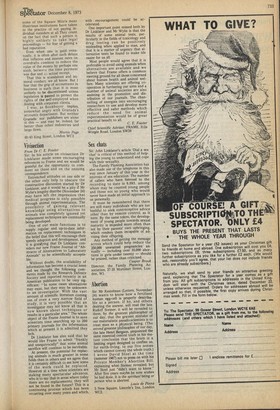Vivisection
From Dr C. E. Foister
Sir: In his article on vivisection Dr Linklater made some encouraging references to Frame and we would be grateful for the opportunity to comment on these and on the ensuing correspondence. Entrenched attitudes on one side or the other only help to obscure the constructive discussion started by Dr Linklater, and it would be a pity if Mr Wylie's lengthy diatribe (November 24) may have left the impression that medical progress is only possible through animal experimentation. The possibility of gaining relevant knowledge using alternatives to animals was completely ignored yet replacement techniques are continually being developed. One of our main functions is to supply regular and up-to-date information on replacement techniques in the belief that this will encourage their speedy adoption and development, and it is gratifying that Dr Linklater considers our new Frame Journal of "Abstracts of Alternatives to Laboratory Animals" to be scientifically acceptable.
Without doubt, the availability of information has become a crucial issue and we thought the following cont.. ments made by the Research Defence Society and reported recently in an American publication to be very significant: "In some cases alternatives may exist, but they may be unknown to an investigator. With the vast amount of scientific literature coming out of even a very narrow field of study, it is very possible that an Investigator may not know all that is now known about techniques or results in a particular area." The whole object of the Frame Journal is to save scientists time searching up to 200 primary journals for the information which at present it is admitted they lack.
Dr Linklater has also said that he would like Frame to admit "frankly and unequivocally" that some animal sacrifice will continue to be inevitable.
At present, the potential for replacing animals is much greater in some fields than in others and we agree that it is certainly difficult to see how some of the work could be replaced. However at a time when scientists are making many spectacular advances, who is to say that in areas where today there are no replacements, they will not be found in the future? This is a continuing process which has been occurring over many years and which, with encouragement could be accelerated.
One important point missed both by Dr Linklater and Mr Wylie is that the results of some animal tests, par ticularly in the fields of toxicology and drug testing can be positively misleading when applied to man, and that it is a matter of urgency that alternative tests be found to make life easier for us all.
Most people would agree that it is preferable to avoid using animals when alternatives are available and we believe that Frame offers a common meeting ground for all those concerned about human health and animal wel fare. Many scientists are offering cooperation in furthering our aims and a number of animal societies are also assisting in the promotion and distribution of our journals. The chan nelling of energies into encouraging researchers to use and develop more effective and safer methods which reduce the need for animal experimentation would be of great practical benefit to all.
C. E. Foister Chief Scientific Adviser, FRAME. 312a Worple Road, London SW20










































 Previous page
Previous page